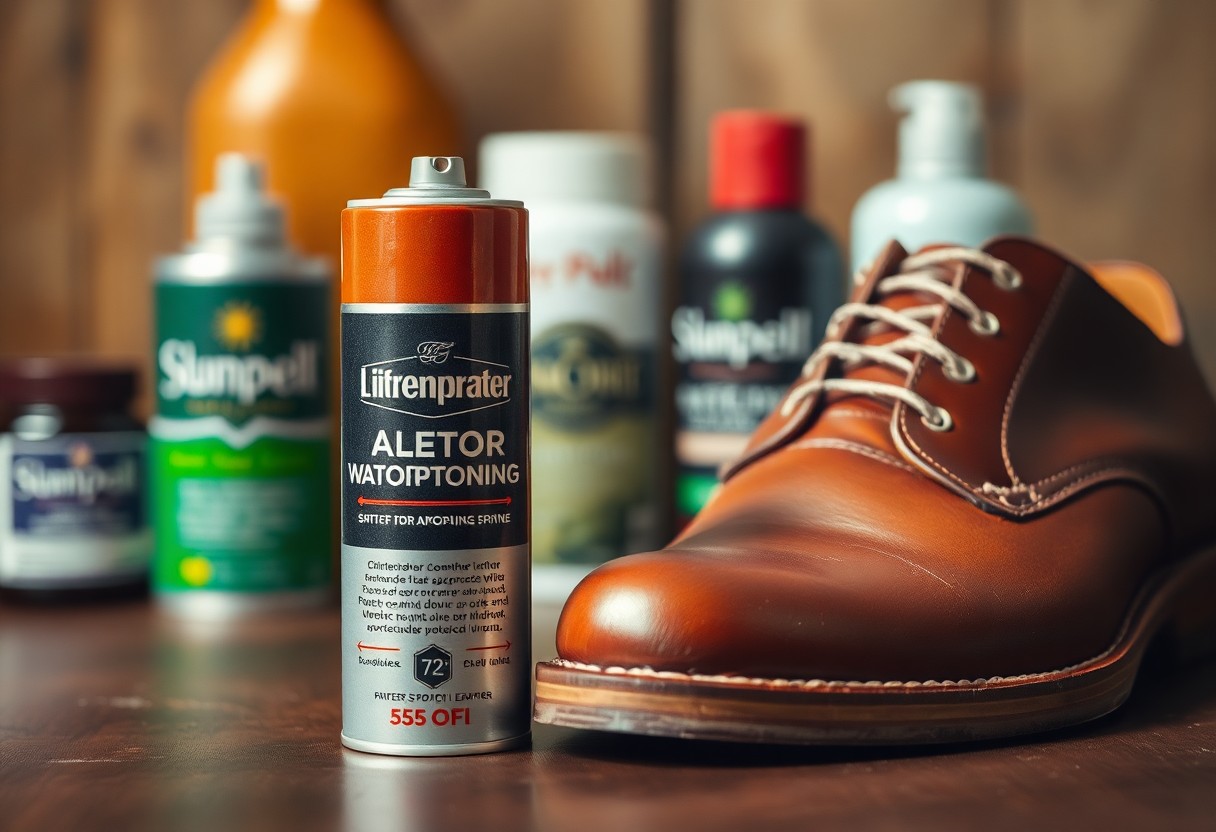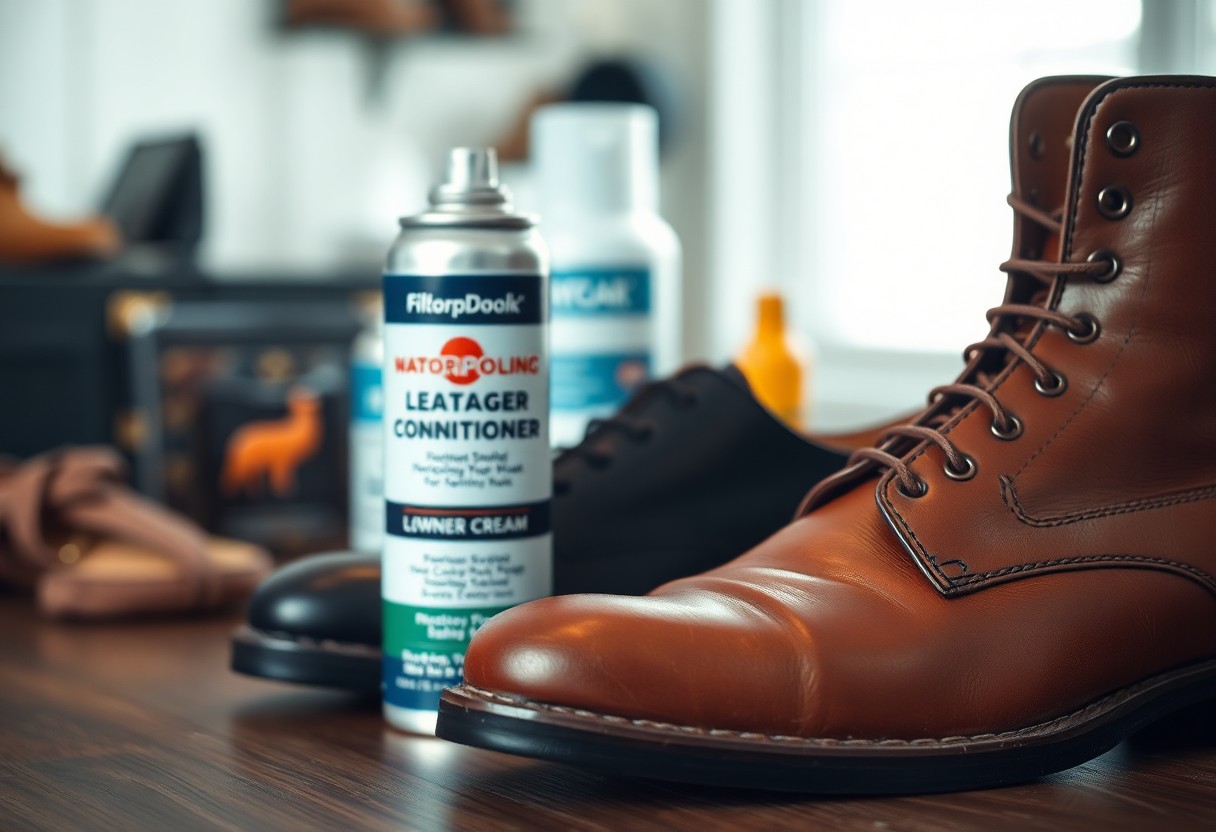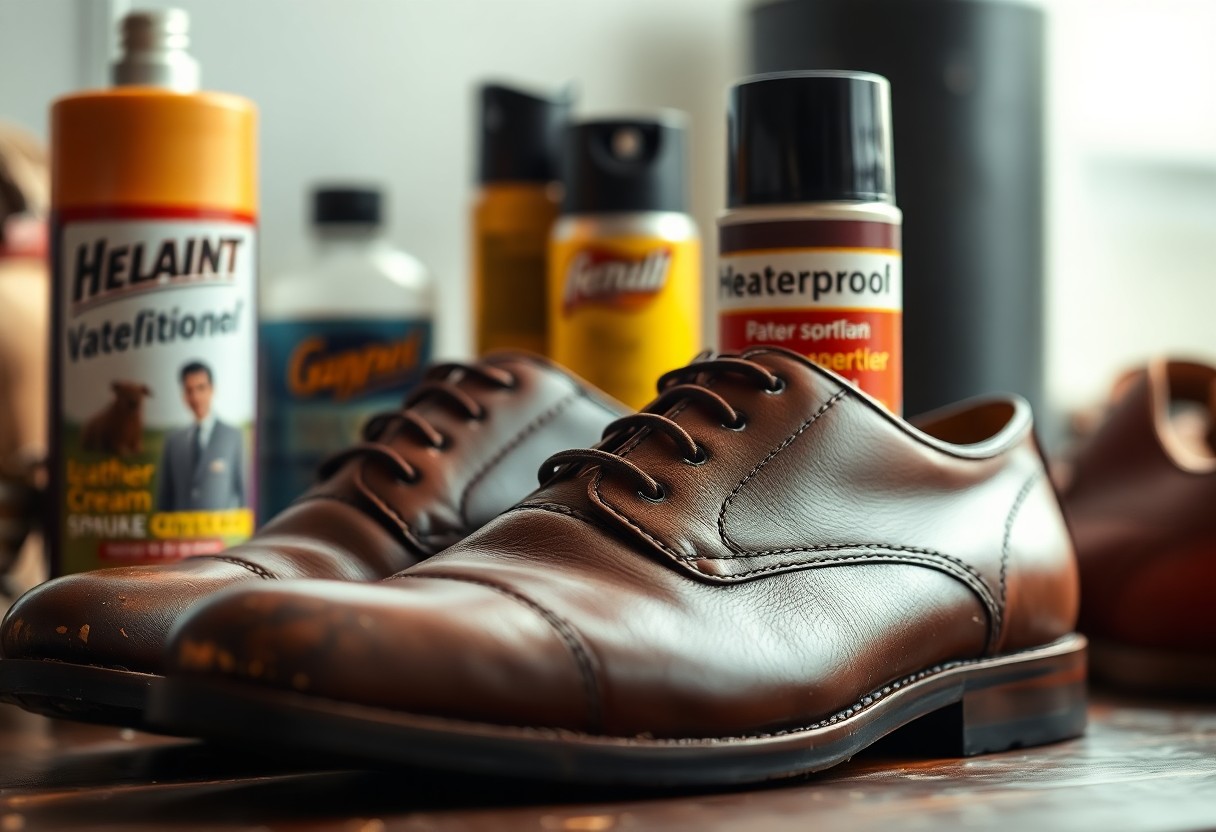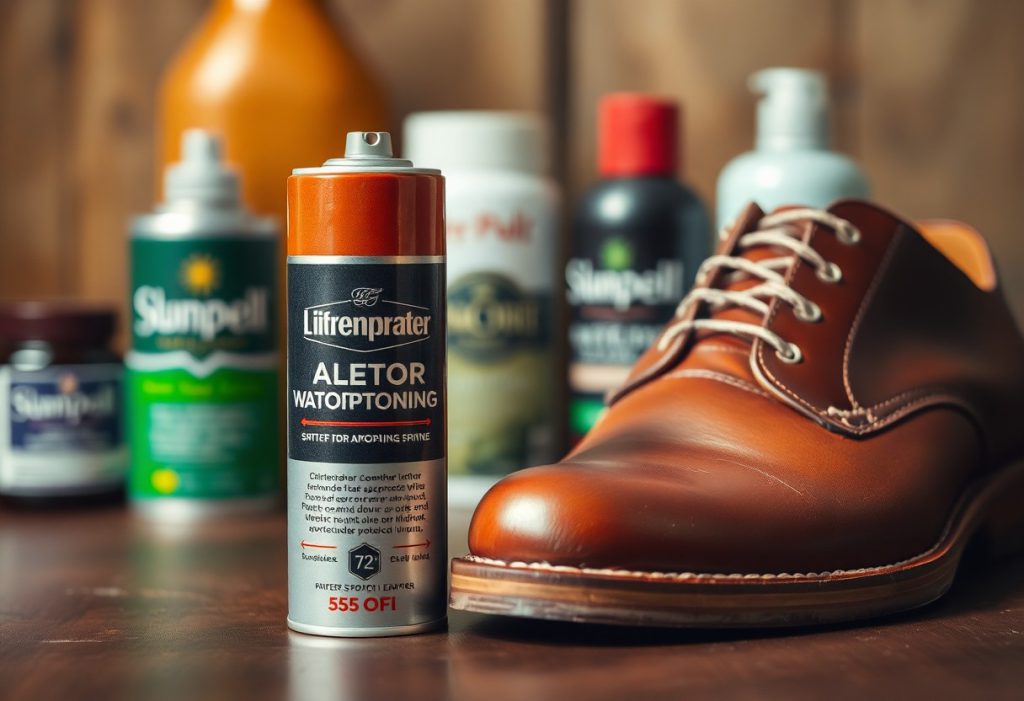Mistakes in Leather Care can result in irreversible damage to your valuable footwear. A common misconception is that using waterproofing sprays on smooth leather is an effective protective measure. While these sprays may seem convenient, they can hinder the absorption of vital nutrients into the leather, leading to eventual dryness and cracking. Smooth leather shoes come equipped with natural water-resistant features inherent in their grain layer, necessitating regular nourishment through shoe creams and waxes to ensure their longevity. Instead of relying on sprays, choose high-quality leather conditioners and wax polishes that not only protect but also nourish the leather, maintaining its integrity and enhancing its lifespan.
Mastering Leather Protection Techniques for Longevity
To preserve the lifespan of your leather items, it’s essential to understand their protective qualities. Full grain leather is renowned for its natural water-resistant properties, attributed to its tightly woven fiber structure. However, these characteristics only remain effective with regular maintenance. The durability of your leather is highly contingent on the care it receives. When waterproofing sprays are utilized, they can compromise the leather’s breathability, leading to significant damage if not managed appropriately. Therefore, it is essential to adopt correct care strategies that ensure the longevity of your leather goods.
Unveiling the Unique Benefits of Full Grain Leather
Following the tanning process, full grain leather retains its original surface layer, which offers remarkable natural protection. Items crafted from this premium material feature an intact grain layer that provides resistance against both water and wear. This outer layer is abundant in natural oils and fibers that create a protective barrier, rendering additional waterproofing sprays unnecessary and potentially harmful to the leather’s overall health. Embracing the natural advantages of full grain leather ensures that your footwear remains resilient and visually appealing.
Insights into Leather’s Moisture Management and Aging Dynamics
Grain leather is designed to effectively absorb and expel moisture, maintaining its flexibility and preventing unsightly cracks. The pores within the leather facilitate its ability to breathe and manage moisture levels. However, the application of waterproofing sprays can seal these pores, hindering crucial airflow and disrupting the leather’s natural moisture equilibrium. Moreover, as leather ages, it requires appropriate nourishment through conditioning products. The use of waterproofing sprays can create a barrier that prevents essential oils from penetrating the leather, resulting in a dry, brittle material over time. Regularly applying leather cream allows your items to age gracefully, developing a rich, attractive patina while maintaining structural integrity.

Recognizing the Dangers of Waterproofing Spray Usage
Many people operate under the belief that waterproofing spray is the ultimate solution for protecting their leather shoes; however, this common practice can result in significant harm to your footwear. While these sprays may provide an immediate protective shield against water damage, they simultaneously obstruct critical nutrients from reaching the leather, potentially setting the stage for long-term deterioration.
Dispelling Marketing Misconceptions Regarding Leather Care
The prevalence of aggressive marketing campaigns and well-intentioned advice from shoe retailers may have led you to believe that waterproofing spray is mandatory for all leather footwear. This belief is perpetuated by many retailers due to the substantial profit margins and frequent repurchase rates associated with these products. The truth is that regular smooth leather possesses inherent protective qualities that do not necessitate additional spray-on barriers for effective safeguarding, allowing your leather to maintain its health and appearance.
Weighing Short-term Benefits Against Long-term Damage
The deterioration of your leather shoes begins when waterproofing sprays create a barrier that prevents essential oils and conditioning agents from penetrating the leather. Although you may initially observe improved water resistance, the reality is that your leather gradually becomes dry and brittle without the necessary nourishment. The consequences of using waterproofing sprays on smooth leather extend beyond superficial protection. Your leather requires consistent nourishment to maintain its flexibility and durability. When shoe creams and conditioners are unable to penetrate the leather due to this spray barrier, the material risks cracking and deterioration, significantly reducing your shoes’ longevity. Instead, opting for natural waxes and proper conditioning methods provides superior long-term protection while promoting the health of the leather.

Diving Deep Into Leather Care Science
Understanding the molecular structure of leather is fundamental to effective care practices. The collagen fiber networks within your leather shoes require both protection and nourishment. Products applied to leather can interact with these fibers by either forming a surface coating or penetrating deeper into the material. This interaction is vital for the long-term health of your leather footwear, as it determines how well the leather can maintain its quality over time.
The Critical Need for Nourishing Leather Regularly
It’s crucial to recognize that your leather shoes need regular nourishment to preserve their quality and aesthetics. The natural oils present in your leather footwear help prevent cracking and maintain flexibility. Over time, these oils can diminish due to normal wear, exposure to the elements, and environmental conditions. To maintain the leather’s structural integrity, it is essential to replenish these oils through proper, consistent conditioning practices.
Understanding the Barrier Effects Created by Waterproofing Sprays
A notable concern regarding waterproofing sprays is their tendency to form a barrier. When these sprays are applied to smooth leather, they create an impermeable layer that obstructs both moisture and essential nutrients. This barrier inhibits your leather care products from effectively penetrating the surface, causing a gradual decline in the quality of the leather over time.
The barrier effect introduced by waterproofing sprays creates a problematic cycle for your shoes. While these sprays effectively block water, they simultaneously prevent the absorption of conditioning products critical for maintaining the leather’s health. Consequently, the leather may appear protected externally but is, in fact, dehydrating and becoming brittle beneath this false layer of security. Silicone-based sprays are particularly damaging, as they form a permanent barrier that can be challenging to remove without causing harm to the leather.
Implementing Proven Methods for Effective Leather Protection
Contrary to popular beliefs, your smooth leather shoes require dedicated care strategies that align with the natural properties of full-grain leather. The optimal approach combines traditional care techniques with products specifically designed to enhance the leather’s innate protective qualities, ensuring immediate safeguarding and lasting durability for your footwear.
Harnessing the Power of Wax-based Solutions for Leather Care
A highly effective alternative to waterproofing sprays is premium wax-based products. These solutions work harmoniously with your leather’s natural grain, rather than against it. The application of wax polish generates a protective layer that allows the leather to breathe, making it especially beneficial for areas like toe caps and high-wear spots.
Maximizing the Benefits of Cream and Conditioner Applications
In contrast to conventional spray treatments, leather creams and conditioners offer essential nourishment while preserving the leather’s intrinsic protective properties. Your shoes benefit from oils that penetrate deeply into the material, helping to prevent drying and cracking. Additionally, the regular application of cream and conditioner creates a cumulative effect that enhances leather quality over time. The natural oils contained in these products support the leather’s flexibility and strength, allowing it to develop a stunning patina. It is advisable to apply these products every 4-6 wears to maintain the optimal condition of the leather.

Identifying When to Use Waterproofing Spray Responsibly
Unlike smooth leather, certain materials benefit significantly from waterproofing sprays. These products create an efficient water-resistant barrier on specific materials that lack inherent protection. Waterproofing sprays are especially advantageous for suede, nubuck, and various textiles, where the material structure does not provide natural resistance to moisture.
Enhancing the Durability of Suede and Nubuck with Waterproofing Spray
When you treat your suede or nubuck shoes with waterproofing spray, you substantially increase their resistance to moisture damage. While many modern suede materials arrive pre-treated with factory waterproofing, additional spray applications can help maintain this level of protection over time. The application of spray creates a shield that effectively prevents water from penetrating these delicate materials.
Ensuring Comprehensive Protection for Textile Footwear
In addition to leather alternatives, textile footwear requires tailored protection against water damage. Materials such as canvas, mesh, and synthetic fabrics can achieve enhanced water resistance through proper spray application. Most textile materials are naturally absorbent, rendering them vulnerable to water damage and staining.
Moreover, waterproofing sprays for textiles help to preserve the shape and color of your shoes. The barrier they create also prevents dirt and debris from embedding within the fabric fibers. It is advisable to reapply the spray every 3-4 months to ensure optimal protection, depending on usage frequency and weather conditions.
Expert Insights on Optimal Leather Care Practices
Not all leather care products are created equal. Leather care professionals strongly caution against the use of waterproofing sprays on smooth leather. Your full-grain leather shoes require specialized care strategies that enable them to breathe and absorb nourishing treatments. Employing inappropriate products can lead to leather damage with repair costs reaching hundreds of dollars.
Expert Opinions from Tannery Professionals
To preserve the quality of leather, tannery experts emphasize that full-grain leather inherently possesses natural water-resistant qualities in its outer layer. Maintaining the leather’s protective attributes necessitates the application of oils and waxes. Waterproofing sprays can obstruct these crucial treatments from penetrating the leather, ultimately compromising its integrity and appearance.
Insight from Professional Cobblers on Long-term Leather Care
For the enduring care of leather, professional cobblers advocate for the use of wax-based products instead of waterproofing sprays. Your footwear will thrive from treatments that both protect and nourish the leather. Studies indicate that 90% of premature leather damage is attributed to the use of improper care products.
By adhering to proper leather care techniques, your shoes can enjoy an impressive lifespan of 15-20 years, compared to just 2-3 years with inadequate maintenance. Traditional wax treatments allow leather to retain its natural attributes while providing sufficient moisture protection. Your investment in high-quality leather footwear deserves careful attention to maintain both aesthetic charm and durability.
Key Recommendations for Effective Leather Care
Your smooth leather shoes require careful care that excludes waterproofing sprays. Instead, opt for nourishing shoe creams and waxes that provide effective water protection while enhancing the leather’s health. Full-grain leather naturally possesses protective qualities due to its grain layer, and waterproofing sprays can block essential oils from penetrating the leather, leading to dryness and cracking. Save waterproofing sprays for suede, nubuck, or textile footwear, where they can be truly effective. By choosing the appropriate products, you can effectively safeguard your leather shoes, ensuring their longevity and continued beauty.
Your Leather Care Questions Answered
Q: Why are waterproofing sprays harmful to smooth leather shoes?
A: Waterproofing sprays create a barrier on leather that obstructs essential oils and conditioners from penetrating the material. While they do provide a degree of water protection, they inhibit the necessary nourishment of the leather, which can lead to drying and potential cracking over time, ultimately shortening the lifespan of your shoes.
Q: What should I use instead of waterproofing spray on smooth leather shoes?
A: Consider using a combination of shoe cream and wax polish instead. Shoe cream supplies essential oils to nourish the leather, while wax polish creates a protective layer that helps repel water. This approach works in harmony with the natural protective attributes of full-grain leather, preserving the leather’s health while delivering effective water resistance.
Q: What types of footwear can I safely apply waterproofing spray to?
A: Waterproofing spray is suitable for materials such as suede, nubuck, and textiles. These materials lack the natural protection found in smooth leather and therefore benefit from the protective barrier created by waterproofing sprays. Many modern suedes and nubucks may already have factory waterproofing treatments, but further spray applications can enhance and maintain this level of protection.
The Article Why you shouldn’t use waterproofing spray on regular smooth leather and better alternatives appeared first on My Shoes Finder
The Article Waterproofing Spray on Smooth Leather: Risks and Alternatives Was Found On https://limitsofstrategy.com


I really appreciate you shedding light on the common misconceptions surrounding leather care. It’s something I’ve noticed too, especially with the hype around waterproofing sprays. The idea of simply spraying my shoes and being done with it seemed so convenient at first, but I started to wonder about the long-term impacts on the leather. I remember when I first invested in a pair of quality leather boots, and they looked stunning fresh out of the box. It was a hard lesson learned when, after a few uses, I noticed them starting to dry out and lose their luster.